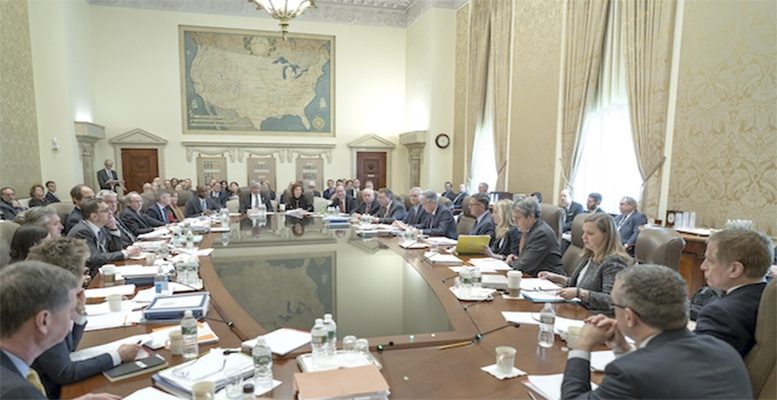During his presidential campaign, Donald Trump vented unrestraint criticism on the Federal Reserve, blatantly accusing ex chair Janet Yellen of keeping the benchmark Fed Funds rate artificially low to fuel the Democrats agenda (possibly unaware of a convalescing economy), forthrightly accusing her as being “very political…and should be ashamed of herself”. Somewhat rich from a populist leader who publicly advocates a corporate friendly, non-interventionalist free market America.
Having gained independence from the US Treasury in 1951, one has never doubted the concealed allegiance of democracy’s most powerful central bank to Wall Street’s top investment firms, constructing policies to suit their commercially driven needs. Yet, once sworn in, President Trump automatically had it in his power to hand pick five out of seven FOMC Board members, and this belligerent president was unlikely to renege upon the opportunity to take his battle to Wall Street, holding the controlling majority of the Fed within his clutches.
Throughout 2018, just prior to US mid-term elections, Trump clashed with the Fed on the negative impact of rising interest rates on economic growth. Benchmark rates were stood in the range 0.50-0.75% when he was sworn in, rising to today’s range of 2.25-2.50%. Yellen’s successor, Jerome Powell, argued the need to maintain price stability and to prevent the economy from overheating.
Although Trump praised Powell for his “wisdom” and “skills” when he formally nominated him back in November 2017, within a year of this endorsement he relentlessly called in to question Jay Powell’s stewardess of the economy against the advice of top White House economic advisers, unprecedently claiming the Fed to be the “only problem in our economy”. We took note of Trump’s indecisive moment as he flickered away from immigration.
The recent surprise U-turn on monetary policy, indicating future rates for this year are now likely to be on hold in contrast to guidance issued at the previous meeting, raises questions over whether Trump’s criticism has been influential.
Powell cited slower growth in China, a lack of clarity over government domestic and trade policies and fallout from Brexit, as his principle arguments for “a weaker case for raising interest rates”, further announcing that the Fed stood ready to alter balance sheet reduction policy, if necessary.
Traditional vocabulary made popular by both Bernanke and Yellen describing monthly turbulence as “transitory” had been replaced in favour of concern over “crosscurrents” and “doing the right thing”. Analysts were not stumped by the change in rhetoric but rather by the reversal in strategy in that short space of just six weeks between meetings, particularly as no new information was brought to the table in the interim.
Has Trump won a crucial victory over Wall Street? If so, he did not end the first month of the year in the way his lost battle over the government shutdown would have suggested.
His recent dinner invitation extended to Jay Powell, could be interpreted as anything but coincidental given the turnaround in Fed policy direction, ultimately forcing the Fed chair to issue a statement that such meetings were not unusual albeit rare; the Fed clearly endeavouring to manage the context, but who is exactly is being managed?
Trumps private residence staged the scene for a dinner whose topics ranged from economic issues to golf, according to persons familiar with the event. Mr Powell himself stressed that the gastronomic undertones of the dinner were consistent with his observations in his last post FOMC meeting press conference.
The impending topic of balance sheet reduction under new dovish Fed guidance would have undoubtedly featured as the spécialité de la carte on Chef Trump’s carefully orchestrated gourmet meal. And with the Fed poised to announce the eagerly awaited content of their programme, analysts will be wondering just how well the Fed chair digested the President’s bill of fare.





